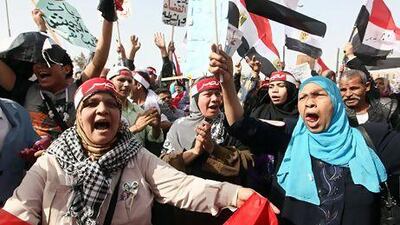Calls are growing for Egypt's military to take back the reins of power at a time when the country's economic woes are deepening and frustration with the rule of Islamist president Mohammed Morsi is growing.
Bruised by the criticism of its handling of the country during nearly 17 months in power after Hosni Mubarak's downfall, the military may not be prepared to delve into politics again, at least for now. However, public comments by top generals that the military would not hesitate to side with the people and its warnings of severe repercussions of continued political unrest is feeding speculation that they are not ruling out intervention altogether.
Already, army troops have been deployed in two cities on the Suez Canal - Port Said and Ismailia - to protect key institutions such as ports and industrial complexes, following a wave of protests there against Mr Morsi's rule. The troops were received as heroes in both cities. Thousands of people from across the country have taken the symbolic but significant step of legally recording their wish to see the military back at the helm, submitting statements to the offices of the state registerer. On Friday, street rallies in Cairo and elsewhere called for the army to seize power.
Some analysts dismiss the growing calls for the return of the military as a reflection of frustration with Mr Morsi than a belief that an armed intervention can resolve the country's problems.
"The military is waiting on the wings, watching whether conditions will worsen enough that its intervention is necessary. We are talking about sustained mass protests, civil war or sectarian violence," said Khalil Al Anani, an Egypt expert based in Britain. "In reality, everyone's money is on giving the Morsi administration an economic lifeline to stave off bankruptcy, achieving political reconciliation and persuading the president to correct some of his policies."
Egypt's military had a monopoly on power since army officers staged a 1952 coup that toppled the monarchy. For nearly six decades, all of Egypt's presidents hailed from military background. Mr Morsi, who took office in June last year, is the country's first civilian president.
The power of the military in Egypt has not only been restricted to the land's highest office.
On retirement, generals have been rewarded with powerful jobs such as cabinet ministers, provincial governors, heads of state utilities, ambassadors abroad and local councils. Bolstered by US$1.3 billion (Dh4.78bn) in annual US funding, the military has over the years built an economic empire that includes weapons, factories, properties and construction businesses.
Government funds that are out of purview of civilian authorities are shielded from any oversight, and the military reportedly accounts for at least 25 per cent of the country's GDP.
But the military's image as the nation's guardian and protector was seriously dented during its rule following the ouster of Mubarak in February 2011.
Rights activists blame the military for human rights abuses, including torture, mismanaging the transition and of hauling at least 10,000 civilians before military tribunals for trial. Images of troops beating up unarmed protesters, including a woman stripped down to her underwear and lying helplessly on the ground while being kicked by soldiers, remain in many people's minds.
But with jobs disappearing, foreign reserves shrinking, businesses closing and prices raising, Egyptians are more likely look to the generals as their possible saviours.
Pro-democracy activists and opposition leaders are publicly distancing themselves from calls for the army to seize power. The purists among them maintain that they would like to bring down he rule of the Islamists alone and that a return to power by the military would be a massive setback for the country's shift to democratic rule.
However, others see Islamist rule as a worse than a military government and vow that once the Islamists are removed, they will campaign for an end to military rule.
Nobel Peace laureate and reform leader Mohammed Elbaradei told a TV interviewer last week that he did not want the return of the military but he would choose it over the militias that are supported by some hardline Islamist groups - ostensibly to fill the security vacuum left by striking policemen. Already, talk about the militias - the Islamists call them popular committees - has given rise to fears of civil war.
More often, however, the calls for a military comeback is rooted in the policies of the Islamists, led by Mr Morsi and his backers, the Muslim Brotherhood.
The Egyptian leader has reneged on many of his campaign promises, from creating an inclusive government to building consensus on the new constitution.
Defence minister and army commander Abdel-Fattah El Sissi has not commented on the calls for the military's return to politics but he has suggested that the military was closely the situation.
Speculation that Mr Morsi was about to fire Mr El Sissi, spread by pro-Brotherhood websites last month, fed tensions between the military and the Egyptian president. Mr El Sissi, picked by Mr Morsi in August, may have angered the president when he signalled the military's readiness to step in, warning that the state would collapse if no solution was found to the political crisis.

